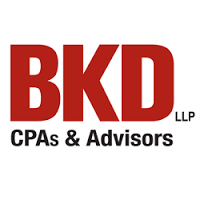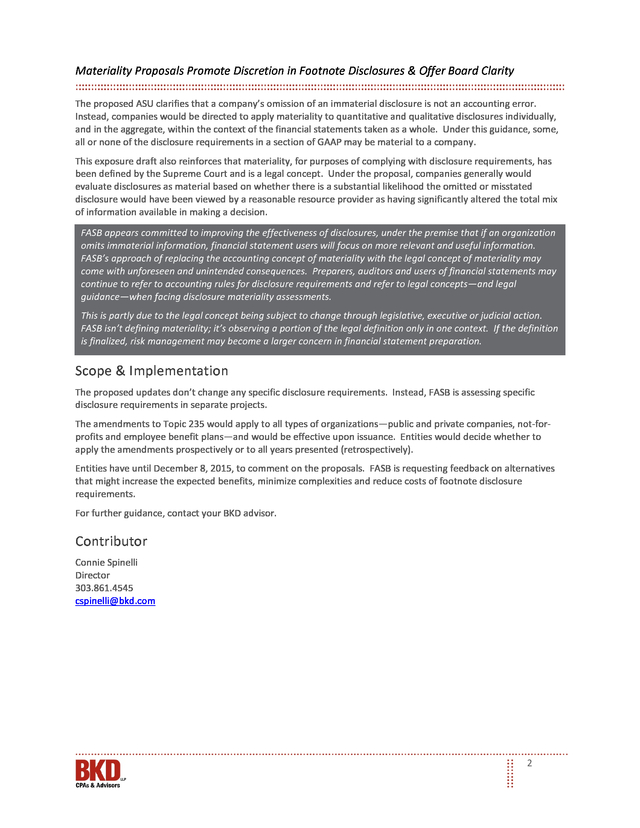Materiality Proposals Promote Discretion in Footnote Disclosures & Offer Board Clarity - November 2015
BKD
Description
Materiality Proposals Promote Discretion in
Footnote Disclosures & Offer Board Clarity
Entities historically have leaned toward overdisclosing for many reasons, including fear of external auditor
objections, litigation and compliance risks and the requirement to communicate omissions of immaterial
disclosures as errors to audit committees. This paper summarizes actions the Financial Accounting Standards
Board (FASB) is taking to omit immaterial disclosures for the benefit of preparers and investors.
On September 24, 2015, FASB issued two exposure drafts to clarify the concept of materiality. The exposure draft
updates FASB’s overarching disclosure framework project, which includes the board’s decision process for FASB
and the entity’s decision process for all types of organizations—public and private, not-for-profits and employee
benefit plans.
The objective and primary focus of FASB’s disclosure framework project is to improve the effectiveness of
disclosures in notes to financial statements by clearly communicating the information most important to users of
each entity’s financial statements. FASB will use the framework to set appropriate, consistent generally accepted
accounting principles (GAAP) disclosure requirements using the board’s decision process, while allowing
companies discretion to communicate materially relevant information in a manner they see most effective—using
the entity’s decision process.
Proposal to Amend the Conceptual Framework
The first exposure draft updates the board’s decision process by proposing amendments to FASB Concepts
Statement No.
8, Conceptual Framework for Financial Reporting, Chapter 3, Qualitative Characteristics of Useful Financial Information. Along with other statements, Concepts Statement 8 establishes the concepts that underlie financial reporting standards. To ensure materiality concepts discussed under the disclosure framework project are consistent with the legal concept of materiality, FASB proposes replacing the definition of materiality in Concepts 8 with the U.S. Supreme Court’s definition.
By clarifying materiality as a fundamentally legal concept, FASB anticipates consistent decision making when determining disclosure requirements in current and upcoming financial and accounting reporting standards. The board currently observes the U.S. Supreme Court’s definition of materiality. Proposal to Amend the Entity’s Decision Process The second proposal would amend Topic 235, Notes to Financial Statements, addressing the entity’s decision process portion of the disclosure framework project.
The proposed Accounting Standards Update (ASU), Assessing Whether Disclosures Are Material, clarifies the way reporting entities should consider materiality when they assess footnote requirements. The proposed ASU promotes use of discretion by management in determining which disclosures are material to an organization based on its own facts and circumstances and thus warrant inclusion in the financial statement notes. The proposed requirement to assess the materiality of disclosures both individually and in the aggregate, along with the proposed removal of existing phrases such as “an entity shall at a minimum provide” may result in increased time spent evaluating sufficiency of note disclosures. Disclosures requiring the most subjectivity and often having the most financial statement impact, such as critical accounting estimates, likely will remain a challenge for preparers, auditors and users of financial statements. . Materiality Proposals Promote Discretion in Footnote Disclosures & Offer Board Clarity The proposed ASU clarifies that a company’s omission of an immaterial disclosure is not an accounting error. Instead, companies would be directed to apply materiality to quantitative and qualitative disclosures individually, and in the aggregate, within the context of the financial statements taken as a whole. Under this guidance, some, all or none of the disclosure requirements in a section of GAAP may be material to a company. This exposure draft also reinforces that materiality, for purposes of complying with disclosure requirements, has been defined by the Supreme Court and is a legal concept. Under the proposal, companies generally would evaluate disclosures as material based on whether there is a substantial likelihood the omitted or misstated disclosure would have been viewed by a reasonable resource provider as having significantly altered the total mix of information available in making a decision. FASB appears committed to improving the effectiveness of disclosures, under the premise that if an organization omits immaterial information, financial statement users will focus on more relevant and useful information. FASB’s approach of replacing the accounting concept of materiality with the legal concept of materiality may come with unforeseen and unintended consequences. Preparers, auditors and users of financial statements may continue to refer to accounting rules for disclosure requirements and refer to legal concepts—and legal guidance—when facing disclosure materiality assessments. This is partly due to the legal concept being subject to change through legislative, executive or judicial action. FASB isn’t defining materiality; it’s observing a portion of the legal definition only in one context.
If the definition is finalized, risk management may become a larger concern in financial statement preparation. Scope & Implementation The proposed updates don’t change any specific disclosure requirements. Instead, FASB is assessing specific disclosure requirements in separate projects. The amendments to Topic 235 would apply to all types of organizations—public and private companies, not-forprofits and employee benefit plans—and would be effective upon issuance. Entities would decide whether to apply the amendments prospectively or to all years presented (retrospectively). Entities have until December 8, 2015, to comment on the proposals.
FASB is requesting feedback on alternatives that might increase the expected benefits, minimize complexities and reduce costs of footnote disclosure requirements. For further guidance, contact your BKD advisor. Contributor Connie Spinelli Director 303.861.4545 cspinelli@bkd.com 2 .
8, Conceptual Framework for Financial Reporting, Chapter 3, Qualitative Characteristics of Useful Financial Information. Along with other statements, Concepts Statement 8 establishes the concepts that underlie financial reporting standards. To ensure materiality concepts discussed under the disclosure framework project are consistent with the legal concept of materiality, FASB proposes replacing the definition of materiality in Concepts 8 with the U.S. Supreme Court’s definition.
By clarifying materiality as a fundamentally legal concept, FASB anticipates consistent decision making when determining disclosure requirements in current and upcoming financial and accounting reporting standards. The board currently observes the U.S. Supreme Court’s definition of materiality. Proposal to Amend the Entity’s Decision Process The second proposal would amend Topic 235, Notes to Financial Statements, addressing the entity’s decision process portion of the disclosure framework project.
The proposed Accounting Standards Update (ASU), Assessing Whether Disclosures Are Material, clarifies the way reporting entities should consider materiality when they assess footnote requirements. The proposed ASU promotes use of discretion by management in determining which disclosures are material to an organization based on its own facts and circumstances and thus warrant inclusion in the financial statement notes. The proposed requirement to assess the materiality of disclosures both individually and in the aggregate, along with the proposed removal of existing phrases such as “an entity shall at a minimum provide” may result in increased time spent evaluating sufficiency of note disclosures. Disclosures requiring the most subjectivity and often having the most financial statement impact, such as critical accounting estimates, likely will remain a challenge for preparers, auditors and users of financial statements. . Materiality Proposals Promote Discretion in Footnote Disclosures & Offer Board Clarity The proposed ASU clarifies that a company’s omission of an immaterial disclosure is not an accounting error. Instead, companies would be directed to apply materiality to quantitative and qualitative disclosures individually, and in the aggregate, within the context of the financial statements taken as a whole. Under this guidance, some, all or none of the disclosure requirements in a section of GAAP may be material to a company. This exposure draft also reinforces that materiality, for purposes of complying with disclosure requirements, has been defined by the Supreme Court and is a legal concept. Under the proposal, companies generally would evaluate disclosures as material based on whether there is a substantial likelihood the omitted or misstated disclosure would have been viewed by a reasonable resource provider as having significantly altered the total mix of information available in making a decision. FASB appears committed to improving the effectiveness of disclosures, under the premise that if an organization omits immaterial information, financial statement users will focus on more relevant and useful information. FASB’s approach of replacing the accounting concept of materiality with the legal concept of materiality may come with unforeseen and unintended consequences. Preparers, auditors and users of financial statements may continue to refer to accounting rules for disclosure requirements and refer to legal concepts—and legal guidance—when facing disclosure materiality assessments. This is partly due to the legal concept being subject to change through legislative, executive or judicial action. FASB isn’t defining materiality; it’s observing a portion of the legal definition only in one context.
If the definition is finalized, risk management may become a larger concern in financial statement preparation. Scope & Implementation The proposed updates don’t change any specific disclosure requirements. Instead, FASB is assessing specific disclosure requirements in separate projects. The amendments to Topic 235 would apply to all types of organizations—public and private companies, not-forprofits and employee benefit plans—and would be effective upon issuance. Entities would decide whether to apply the amendments prospectively or to all years presented (retrospectively). Entities have until December 8, 2015, to comment on the proposals.
FASB is requesting feedback on alternatives that might increase the expected benefits, minimize complexities and reduce costs of footnote disclosure requirements. For further guidance, contact your BKD advisor. Contributor Connie Spinelli Director 303.861.4545 cspinelli@bkd.com 2 .













